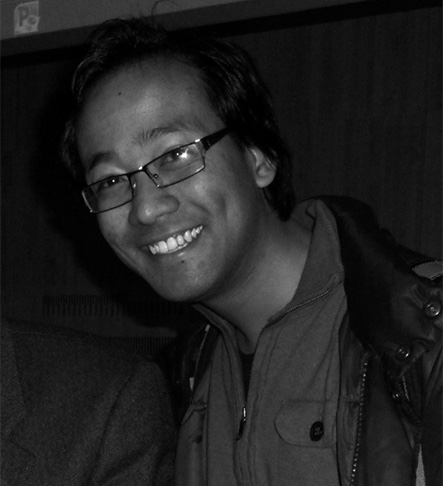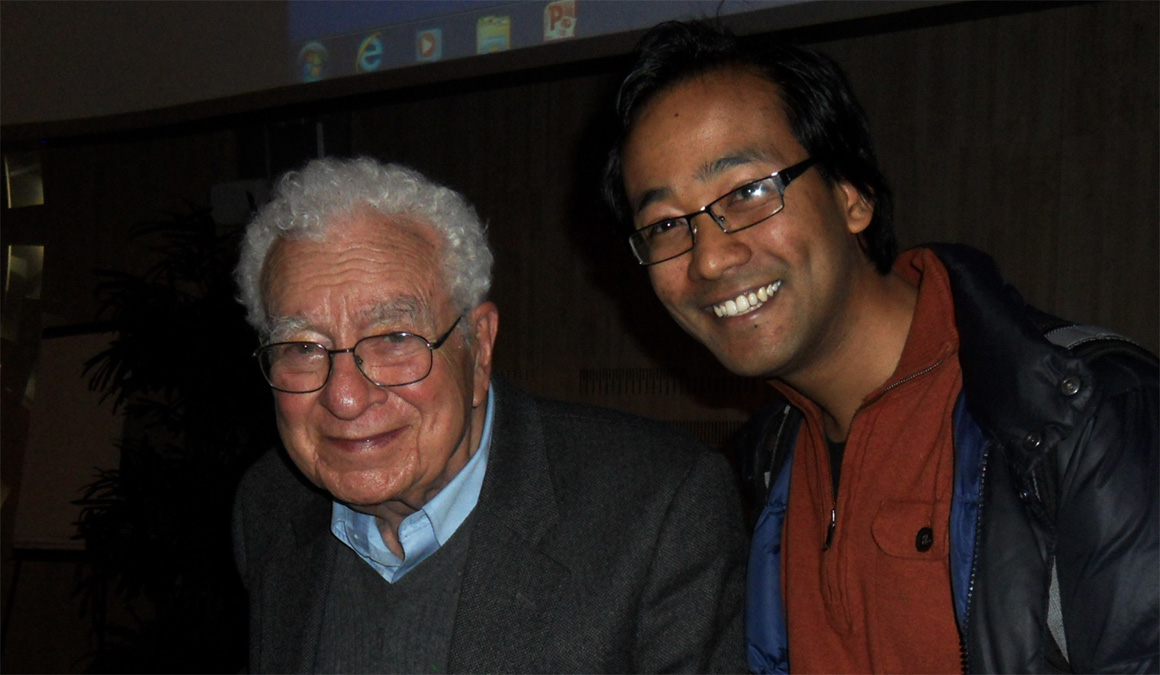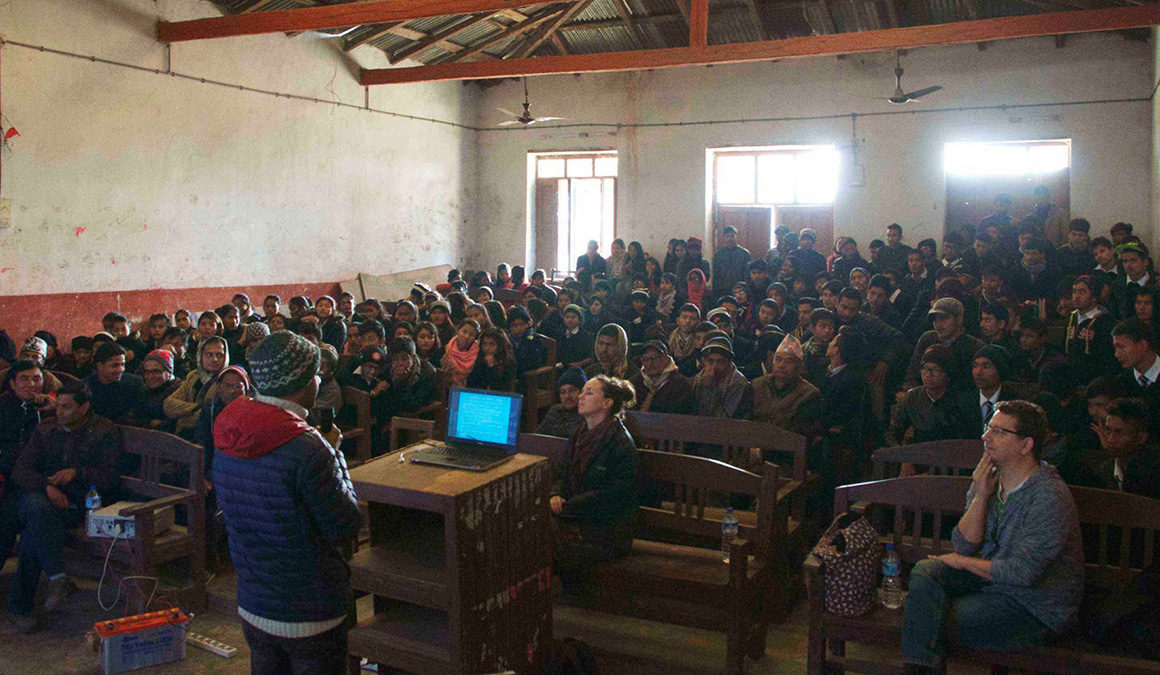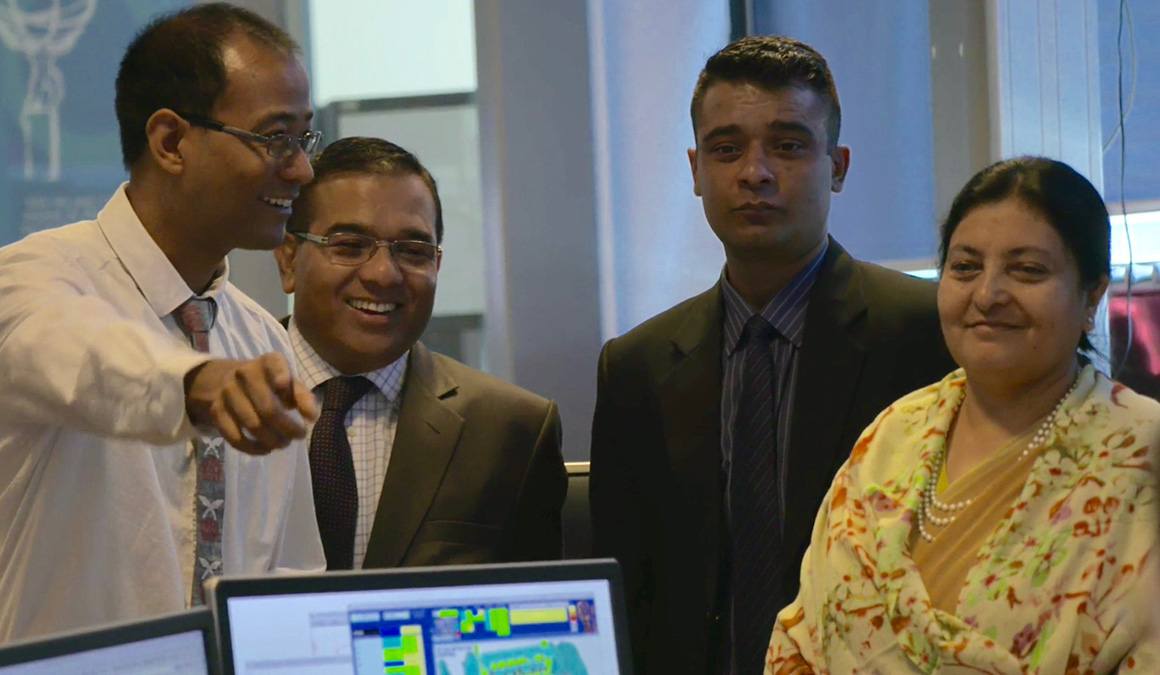Suyog Shrestha ’06
From Nepal to Grinnell to Switzerland and beyond.

Particle physicist Suyog Shrestha ’06 explores the universe.
Suyog Shrestha ’06 has experienced far more of the world than most of us.
Born and raised in Nepal, he knew early on that he wanted to study physics in the U.S., and in the summer of 2002, he came to Grinnell. Now a particle physicist, he’s been working at CERN (the European Organization for Nuclear Research), just outside Geneva, Switzerland, for the past decade.
 Suyog Shrestha ’06, right, was thrilled to meet his childhood hero, physics Nobel Prize winner Murray Gell-Mann, soon after Shrestha started working at CERN.
Suyog Shrestha ’06, right, was thrilled to meet his childhood hero, physics Nobel Prize winner Murray Gell-Mann, soon after Shrestha started working at CERN.
“CERN’s like a big Grinnell but dedicated to physics,” says Shrestha, who lives in a small French town over the border. “It’s a Disneyland for physicists, very diverse and international.”
Shrestha, who clearly enjoys his work, describes his research as “finding new laws of nature.”
“I am an experimental high-energy particle physicist, who studies the proton-proton collision data at the Large Hadron Collider to probe the weakness of the current laws of physics, and to search for new laws of physics by directly searching for new particles or by measuring the properties of the already discovered particles such as the Higgs boson.”
The overarching goal of his research is to understand the fundamental constituents of the universe, such as the elementary particles and their interactions, and the nature of space and time. His work has practical applications in data science, supercomputing, nuclear medicine, medical imaging, and radiation therapy for cancer.
At CERN, Shrestha also educates and trains young scientists. He’s supervised graduate and undergraduate students from around the world; organized particle physics and supercomputing training schools; mentored summer students; and organized international workshops and outreach programs. “It’s always a lot of fun supervising students because they ask so many deep questions and they really make me think,” he says. “Discussing ideas with them inspires me.”
When he started at CERN in 2011, Shrestha was a Ph.D. student at Iowa State University, and part of the team that discovered the Higgs boson particle. That discovery led to the 2013 Nobel Prize in physics for the theorists who predicted this particle back in 1960s. The collective contribution Shrestha was part of was mentioned in the Nobel Prize citation.
He’s currently wrapping up his post-doctoral studies through Ohio State University. “CERN provides infrastructure and facilities, but invites collaborators from all over the world to work together and build experiments on behalf of their own institutions. It’s kind of like the United Nations, with scientists representing different institutions and countries.”
Shrestha was the only physicist from Nepal when he began at CERN. There are now about a dozen, thanks to Shrestha and colleagues who run outreach programs.
 Shrestha gives a public outreach talk at Kamalamai High School in Sindhuli, Nepal, where he once was a student.
Shrestha gives a public outreach talk at Kamalamai High School in Sindhuli, Nepal, where he once was a student.
“We do a kind of on-the-road program in Nepal for villages, schools, colleges, and cities, to bring a flavor of the research we do,” he says. The team has lectured, worked hands-on with higher-level students, recruited students and teachers for CERN summer training programs, and met with professors and teachers in Nepal to discuss research and to help in any other way.
He was also part of a team that convinced Nepal government officials to invest more in basic science, and he helped form a partnership between CERN and Nepal to provide an exchange of technology and knowledge – including the donation of 200 extremely powerful computer servers to a university in Nepal. “These are super-powerful, three to four-year-old computers servers that CERN had decommissioned, but now researchers and students in Nepal are making great use of them,” he says.
Shrestha grew up speaking Nepali, Hindi, and English, the language of his textbooks, as well as Urdu. He was born in the small city of Biratnagar on the southeast Nepal plains. His parents originally come from the town of Sindhuli, which Shrestha calls home, but he went to school in Kathmandu. “Nepal was going through a civil war and young people were leaving,” he explains.
 Suyog Shrestha ’06, left, points out a feature to Nepal President Bidhya Devi Bhandari, far right, in the ATLAS Control Room.
Suyog Shrestha ’06, left, points out a feature to Nepal President Bidhya Devi Bhandari, far right, in the ATLAS Control Room.
At the time, there weren’t world-class physics programs available, and when he heard from another student at his high school that Grinnell College offered good scholarships to international students, he applied.
Shrestha loved the campus as soon as he arrived with other incoming international students, a week before other new students. “It was very flat, very green, and so beautiful. I grabbed a campus bike and road around town. I socialized a lot from the day I arrived.” By the time domestic new students arrived, he was helping them move in – and making even more friends.
“I wanted to learn about everything,” he says. “I had friends from Morocco, Iraq, Egypt, and Russia. I spent a lot of time learning from everyone at Grinnell. Those are fond memories.”
He enjoyed taking racquetball classes with Director of Athletics and Recreation Andy Hamilton ’85, and other wellness courses. As a researcher with physics Professor William Case, he enjoyed not just the knowledge Case shared but also his insights into life. And Shrestha still applies lessons learned from physics Professor Charles E. Cunningham. “He showed me that part of research is knowing what you don’t know, and finding it out. You have to know what you don’t know.” And he was especially moved and gained insight from Professor Shuchi Kapila’s course on post-colonial literature.
The ever-curious Shrestha learned Russian and lived in Russian House at Grinnell, and learned Arabic to better understand the Middle East. With the addition of French, which he taught himself through YouTube videos and chats with random people on the bus in the village where he lives, that adds up to seven languages.
Just before the pandemic hit, he became a parent. “In some sense it was a blessing because we could stay at home with our baby,” he says. “But it also meant you are working while taking care of a little child. It was a fun-filled, challenging year.” And like everything else in Shrestha’s life, he clearly delighted in the experience.
Learn more about Grinnell College’s physics program.
— by Anne Stein ’84
Coming from diverse socioeconomic, cultural, and intellectual backgrounds, Grinnellians form tight friendships and a deeper knowledge of both ourselves and other humans. Peter Mosher ’14 and Kiyan Ng ’14 are supporting social enterprise in Africa while Marianna Cota ’22 brings her Indigenous background to science studies.